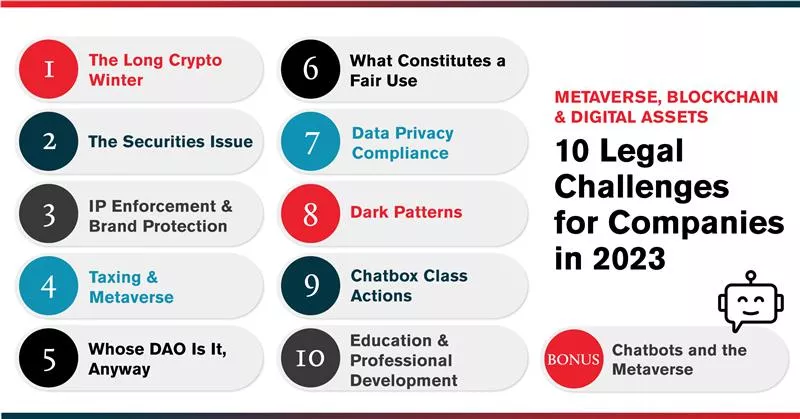Metaverse, Blockchain & Digital Assets: 10 Legal Challenges for Companies in 2023
With the start of the new year, the ArentFox Schiff Metaverse Industry team reviews 10 of the most pressing legal issues for companies in 2023.
On

- The Long Crypto Winter. As the crypto bear market approaches its 15th month and crypto bankruptcies pile up, some are predicting the Metaverse and blockchain will go down too. But the Metaverse and blockchain are bigger than crypto. Companies including Starbucks, L’Oreal, and Nike have moved beyond the buzzwords to create powerful new tools to engage consumers and generate revenue. Whether through blockchain-based loyalty programs, communities of digital creators, or new e-commerce platforms, these companies are demonstrating the value and utility of these technologies. Will the crypto winter keep all of web3 in a deep freeze or will 2023 be the year that companies move past the hype and start building practical applications that boost their bottom line?
- The Securities Issue. The US Securities and Exchange Commission (SEC) has adopted a strategy of developing the law applicable to NFTs and other tokens via aggressive judicial enforcement activity versus rulemaking or the issuance of guidance. SEC Chairman Gary Gensler has consistently asserted that many tokens trading on platforms meet the definition of “securities,” and thus fall within the scope of SEC regulation. The position recently found support in the US District Court for the District of New Hampshire, which concluded on a motion for summary judgement made by the SEC that LBRY, Inc. offered and sold its native digital token, LBRY Credits (LBCs), in violation of Section 5 of the Securities Act of 1933. The SEC’s aggressive posture, together with significant regulatory uncertainty, has likely discouraged many large brands from entering the market. The outcome of pending litigation, including a lawsuit against NFT developer, Dapper Labs, and future enforcement settlements between the SEC and the issuers of tokens and/or those that facilitate transactions in tokens, may bring some much needed clarity.
- IP Enforcement and Brand Protection. Metaverse, blockchain, and augmented reality (AR)/virtual reality (VR) are making brand protection increasingly complex. Brand owners are finding themselves exposed due to limitations of previous go-to online IP enforcement tools such as the DMCA and ICANN’s Uniform Domain Name Dispute Resolution Policy (UDRP). For these technologies to thrive, clear standards and policies need to be in place to protect intellectual property rights and reduce consumer fraud and deception, and this year is likely to be pivotal. Additionally, brand owners proactively should supplement their IP registrations and portfolios to establish rights on virtual platforms and web3 ecosystems, as well as fortify against the new types of infringements that can occur. The AFS IP Enforcement Task Force is helping lead the way toward a web3 that works for creators, developers, brands, consumers, and platforms, and will continue to monitor major developments and best practices.
- Taxing the Metaverse. Companies may face real world tax liabilities and compliance obligations, even if transactions occur in the Metaverse, and companies will need to navigate an increasingly complex tax landscape as states and countries around the globe seek to tax Metaverse transactions. Companies must consider a variety of unanswered tax consequences. For example, in which jurisdiction could a concert in the Metaverse be subject to tax — where the concert was performed or where the audience watched? Or could a sale of NFTs be subject to sales tax or valued-added tax in a jurisdiction where the NFT was sold or purchased, and should the answer depend on whether the sale is an initial sale or a resale? Companies operating in the Metaverse may face additional challenges in seeking to navigate complex withholding tax rules, compliance matters and information reporting requirements. Although tax authorities have been slow to release guidance, companies should not ignore these looming tax issues while establishing a presence in the Metaverse.
- Whose DAO Is It, Anyway? DAOs, or decentralized autonomous organizations, are ubiquitous in web3, but significant questions remain about their legal character and the liability of DAO members. While recent decisions related to the CFTC’s enforcement action against Ooki DAO have seemingly settled whether and how DAOs can be sued and served, it remains to be seen whether a DAO can be held liable under federal commodities laws. The Ooki DAO enforcement action will likely have many DAOs that formed without a formal legal structure (“unwrapped” DAOs) concerned that relying on decentralization instead of a legal wrapper has left DAO members open to being held liable for the DAOs actions.
- What Constitutes a Fair Use? Pivotal legal challenges against StockX’s Vault NFTs (by Nike) and the METABIRKINS NFTs (by Hermès) may help clarify how key legal principles like the First Sale Doctrine, Freedom of Speech under the First Amendment, and Fair Use apply in the context of NFTs and web3. Are NFTs merely a means of authenticating and tracing the underlying metadata content? Can certain uses of NFTs or other applications of blockchain technology transform the underlying metadata/content to support a finding of infringement? Do traditional legal principles apply in this new tech ecosystem or does the new tech ecosystem require reconsideration of traditional legal principles? Clarification from courts may be coming soon to a jurisdiction near you.
- Data Privacy Compliance. Time is running out to ensure that privacy policies comply with the latest laws. California and Virginia’s laws took effect January 1, 2023, and states like Colorado and Connecticut are next. Click here for an overview of these new requirements.
- Dark Patterns. The Federal Trade Commission (FTC) recently announced a $520 million settlement against Epic Games related to Fortnite design and privacy practices. The complaint alleged, among other things, that Epic employed deceptive or misleading design tactics — what the FTC calls “dark patterns” — to drive up revenue, including, for example, by failing to require credit card holders to confirm their identity before charging stored credit cards for subsequent purchases and by employing confusing and inconsistent payment processes. Expect the FTC to continue paying close attention to design practices of other Metaverse platforms and applications.
- Chatbox Class Actions. The second half of 2022 saw a wave of class action litigation under state wiretapping laws against website operators that use widely deployed online technologies, such as chatboxes and session replay software. Any websites or platforms with chatboxes or chat features are potentially at risk. Click here for more details.
- Transforming Education and Professional Development. The COVID-19 pandemic profoundly affected our classrooms and workplaces and three years after its onset, many students and employees are still learning and working remotely. As we continue to evaluate remote learning, AR/VR devices and applications can offer significant advantages over desktop- or laptop-based remote learning experiences and the back-to-back-to-back Zoom calls that came to define pandemic-era work. They can also open doors to experiences that might not otherwise be possible. Instead of a Teams meeting with a colleague across the globe, for example, imagine donning a VR headset and meeting them in a virtual conference center. Instead of reading about Athenian democracy, imagine a group of students taking a virtual tour of the Acropolis. Such use cases may prove pivotal in the development of the Metaverse, but issues such as accessibility, data security, and equity will be critical.
- BONUS! Chatbots and the Metaverse. Many of the most ambitious visions of the Metaverse portray seamless interactions between consumers, their wearable devices, and augmented reality software programs, often via voice-activated digital assistants. The release of generative artificial intelligence program, ChatGPT, in late 2022 shows just how close we may be to making such visions a reality. ChatGPT and similar platforms could turbocharge voice assistants like Siri and Alexa, making hands-free interactions with software and electronics devices seamless, and making the Metaverse more accessible.
If you have questions about any of these issues or want to plan ahead, contact a member of the AFS Metaverse, Blockchain & Digital Assets Industry team.
Contacts
- Related Industries












